GLOBAL Receives AADMD “Local Hero” Award
May 5th, 2023 by admin
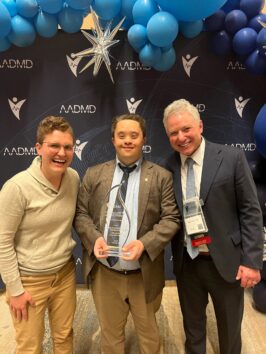 The Global Down Syndrome Foundation is attending and presenting at the 21st annual American Academy of Developmental Medicine & Dentistry (AADMD) One Voice Conference, May 4-7, at the Westin Denver International Airport
The Global Down Syndrome Foundation is attending and presenting at the 21st annual American Academy of Developmental Medicine & Dentistry (AADMD) One Voice Conference, May 4-7, at the Westin Denver International Airport
Today, May 5, 2023, GLOBAL and self-advocate Taylor Shelsta will graciously accept the AADMD “Local Hero” award recognizing the outstanding work and dedication to inclusive health exhibited in the groundbreaking Medical Care Guidelines for Adults with Down Syndrome (GLOBAL Adult Guideline). The GLOBAL Adult Guideline provides first-in-kind, evidence-based medical recommendations to support clinicians in their care of adults with Down syndrome. An accessible family-friendly version for non-medical professionals is available for free download on the GLOBAL website.
“GLOBAL is honored to receive AADMD’s Local Hero award,” says Bryn Gelaro. “Dr. Tyler and many other AADMD members were a pivotal resource for us when creating the GLOBAL Medical Care Guidelines for Adults with Down Syndrome. Together, we are taking steps towards making healthcare a more inclusive place for adults with Down syndrome.”
GLOBAL Research & Medical Care senior director Bryn Gelaro was joined by the AADMD president and GLOBAL Guideline author, Dr. Carl Tyler, the medical director for Denver Health and GLOBAL Adult Down Syndrome Pilot Clinic, Dr. Barry Martin, and GLOBAL self-advocate, Connor Long, to present GLOBAL’s Adult Guideline. The panel titled “Show Me the Evidence! Newest Health Care Guidelines for Adults with Down syndrome” took place today from 1:40 PM to 2:40 PM MST.
The 2023 AADMD One Voice Conference is centered around navigating uncertainty and preparing for inclusive care in any circumstance. The four-day conference had various panels and breakout sessions discussing how to prepare for, pivot and pilot inclusive health.
GLOBAL is honored to be partnering with AADMD on various projects that will help medical professionals, self-advocates and families access valuable resources that will inform quality medical care practices for people with Down syndrome.
Strength, Stability, Balance, Endurance
January 31st, 2023 by Global Down Syndrome Foundation
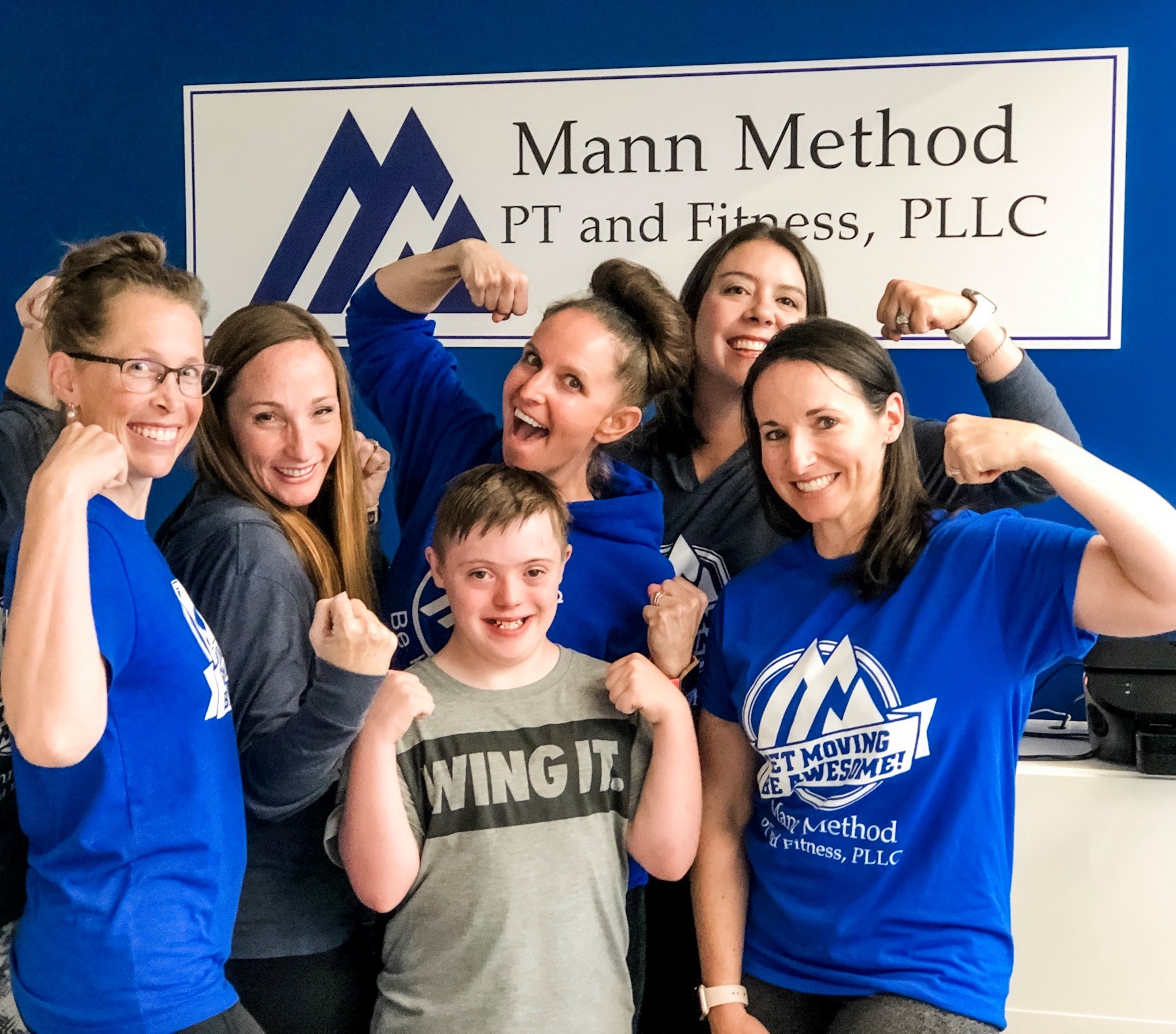
Physical therapists share preventative PT techniques for people with Down syndrome
From Down Syndrome World Issue 3, 2021
“Often times people think of physical therapy (PT) as a place to recover from an injury, like learning to walk after a broken leg. Physical therapy is unique in that we can help when things are hurting, but also provide targeted interventions with the purpose of prevention,” says physical therapist Dr. Sarah Mann, PT, DPT, MBA, NSCA-CPT, founder and CEO of Mann Method PT and Fitness, PLLC and Mann Therapies. “With PT, we encourage listening to the body and taking early action to create healthy and sustainable habits that, over time, can reduce potential problems in the future.”
People with Down syndrome have a unique physiology that impacts their musculoskeletal and cardiovascular systems. Characteristics such as low resting muscle tone, flat feet, joint instability, and low cardiovascular endurance can cause problems like obesity, joint pain, and fatigue. PT addresses physical issues at their root level, first building on the underlying foundational motor skills and then honing those skills to strengthen specific areas of the body. Results include healthier weight management, increased strength, improved balance, increased bone density, improved bowel movements, decreased rates of arthritis and osteoporosis, and ultimately lower levels of pain and fatigue. In turn, this leads to increased motivation for physical activity, improved social functioning with peers, and overall sense of well-being.
Down syndrome physical therapy experts Dr. Sarah Mann, Dr. Patricia Shimanek, and Dr. Kia Mattison share their PT strategies and techniques to address common physical issues experienced by individuals with Down syndrome.
Strength, Stability, Balance, Endurance
“Movement should be purposeful,” says Dr. Mann, who emphasizes four key training areas in her PT method: Strength, Stability, Balance, and Endurance. “After working with hundreds of individuals with Down syndrome and learning how they often respond to various exercises, I find that exercise programs combining these four categories are the most effective in addressing impairments and helping prevent future complications.”
Her physical therapy program, called the Mann Method™, combines foundational movements, hip strengthening, vestibular, and cardiovascular training to focus on multi-joint movements that activate the feet, knees, hips, trunk, and core. Foundational exercises like squats help build muscle and improve function, while balance exercises like lateral tilts help improve weight shift for walking. Progressive sequencing through these various exercises helps build cardiovascular endurance.
“Repetition is a great way to ingrain certain movements into muscle memory,” says Dr. Patricia Shimanek, PT, DPT, an orthopedist at Advocate Aurora General Hospital and mother to a 25-year-old son with Down syndrome. “When my son does push-ups, for example, sometimes he will arch his back too much or hyperextend his elbows. The more he practices the correct form, the better he is able to recognize when and how he needs to move his body to get there.”
Start with the Feet!
Before attending your first PT session, the experts advise to first check your feet! 91% percent of people with Down syndrome have a flat-foot position, which can cause painful misalignments, bad posture, joint pain, and poor proprioception (awareness of body position and movement).
“A reason a lot of adolescents complain of knee pain may be because they’re wearing the wrong footwear. When your foot hits the ground, if it’s not contacting the ground appropriately, it changes the mechanics all the way up effecting the knee, hips, back, and neck,” says Dr. Shimanek. “A quick change in shoes can make a world of difference, helping them to stand up a bit taller, keep their head up, and improve musculoskeletal strength.”
There are many orthotic support options that can be added to your shoes, such as cushion insoles, custom arch supports, and more. If shoe supports do not provide enough stability, PTs can also evaluate for higher level orthotic needs.
Techniques
“Consistency is hugely important to a successful PT program,” says Dr. Kia Mattison, PT, DPT, Director of Physical Therapy at Cobblestone Therapy Group in Roswell, Georgia. “With children, it helps to develop a reward system that encourages this, such as a couple of PT exercises means a couple minutes of playtime. The PT should also collaborate with the patient’s full care team to ensure routines are being practiced and reinforced in various settings.”
Dr. Mattison also advises taking things slow. “Take things one step at a time to allow the individual to gain a mastery of one step before moving onto the next one,” she says. “However, progress takes time and can build slowly over several weeks or months. Make sure to celebrate all the milestones big and small!”
Drs. Mann, Shimanek, and Mattison agree that physical therapy is a lifetime investment. It is not meant to be a temporary intervention that fixes a problem, but instead a training process that builds skills and improves functioning over time.
GET MOVING!
See below exercise modules from GLOBAL’s Webinar with Dr. Sarah Mann “Strength, Stability, Balance, and Endurance – Purposeful PT for Teens and Adults with Down Syndrome.”
To learn more, visit…
Mann Method PT: www.mannmethodpdt.com
Cobblestone Therapy Group: cobblestonetherapy.com/physical-therapist
GLOBAL’s PT Webinar with Sarah Mann: globaldownsyndrome.org/global-webinar-series-spring-2021
Like this article? Join Global Down Syndrome Foundation’s Membership program today to receive 4 issues of the quarterly award-winning publication, plus access to 4 seasonal educational Webinar Series, and eligibility to apply for Global’s Employment and Educational Grants.
Register today at downsyndromeworld.org!
Going for Gold: Elana Meyers Taylor & Nico Taylor
January 10th, 2023 by Global Down Syndrome Foundation
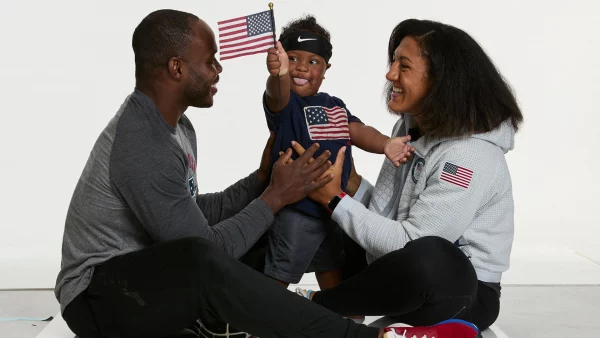
From Down Syndrome World Issue 3, 2022
ELANA MEYERS TAYLOR, has collected numerous inspiring accolades throughout her life. She is perhaps most known for making history in the 2022 Beijing Olympics, receiving her fifth medal (she has three silver and two bronze) in bobsledding. Taylor is the most decorated black Olympic winter sports athlete and the most decorated U.S. Olympic bobsledder of all time. This is an impressive feat for anyone to accomplish, and Elana did it all while raising her beautiful son, Nico, who has Down syndrome.
Like most children, Elana had big dreams for her future at a young age. Since seeing the 1996 Summer Olympic Games in her hometown of Atlanta, Georgia, she knew she wanted to be the one standing on the podium one day. A renaissance athlete, she participated in sports throughout her childhood and well into adulthood. As a kid, she played softball, basketball, track & field, and soccer, all with the intention of becoming an Olympic athlete one day. She went on to play collegiate softball at George Washington University and played professionally after college as well. With all this work building toward her dream of becoming an Olympian, Elana felt immense pressure during her tryout for the US Olympic Softball team. “I put the weight of the world on me and just completely choked.” Taylor stated, “I just couldn’t handle the pressure and thought it was going to be my only chance to live my dream.” This setback allowed her to set her sights on a new sport to carry her to the Olympics.
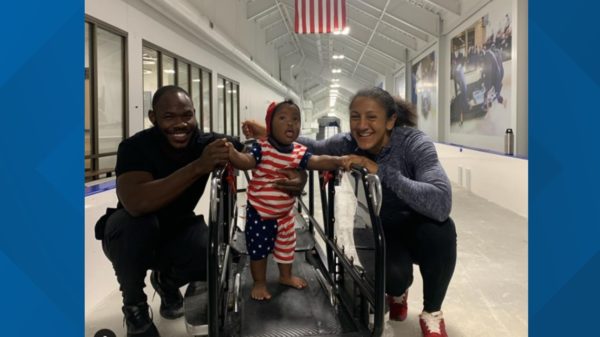
Taylor’s parents, Eddie and Janet Meyers, suggested she check out bobsledding as an option, and even though she knew nothing about the sport, she decided to give it a shot. Her natural athleticism propelled her through the first round of trials where she could then hone her technical skills to make her a strong competitor in bobsledding. After competing in the U.S. National Team trials and World Cup tour, she qualified to race in the World Championship race within her first year as a brakeman.
Her triumph in the World Championship races as a brakeman allowed her to start racing in the front seat as a driver, and from there she began her legacy as a bobsled icon, making her debut on the U.S. bobsled team at the 2010 Vancouver Olympics. She has continued to compete in the two-woman and Monobob races at the Olympic level, and even qualified to race on the men’s four-man bobsled team!
Elana’s story of success in making her way to the Olympics and earning such honorable titles along the way is admirable on its own, but her work does not stop there. Elana is a devoted advocate for women of color competing in the Olympics and uses her 5-medal status to get her foot in the door and initiate change at a higher level. “Other people like to scream and shout and, you know, take to social media and stuff like that. That’s not really my cup of tea.” She prefers to do her work behind the scenes by having these difficult conversations about equity for women of color in sports with the higher-ups in the Olympic committees, pushing for that positive change. It is clear, that Elana has a passion for advocacy and creating space for marginalized groups to excel, and this passion grew even stronger with the birth of her first son, Nico.
Becoming a Mother and an Olympic Athlete
Amid the rise of her Olympic career, Taylor and her husband, fellow Team USA bobsledder Nicholas Taylor, became pregnant with their first child, Nico, who was born at the start of the COVID-19 pandemic in 2020. Following her silver medal-winning run at the 2018 Winter Olympic Games in Pyeongchang, Taylor was unsure if she wanted to compete in another Olympics. She was already a 3-time medal winner and was feeling content with the progress she has already made in her bobsled career. “You can only be driven so much by a gold medal,” stated Taylor. However, the news of her pregnancy sparked a new kind of motivation in Taylor that she did not quite expect. Competing at the Olympic level while navigating pregnancy and becoming a first-time parent was a new challenge that she was determined to take on.
Elana and her husband continued training throughout her pregnancy, adapting a garage in their apartment building into a home gym to get their training schedule back on track. Less than 6 months after Nico was born, Elana was already working towards making the U.S. National Team and eventually competing in the 2022 Winter Olympics. Nico was along for the ride every step of the way, traveling to Lake Placid with his mother to train and cheering her on from the sidelines at competitions across the globe.
Wherever Elana was, Nico went too. She wanted to show the world that just because she is now a mother, let alone a mother of a child who is differently-abled, she is still a force to be reckoned with in her sport. Her new-found motivation from her son and desire to prove to the world that motherhood does not have to thwart a lifetime of progress drove her to the 2022 Winter Olympics in Beijing, where she earned a silver medal in the women’s Monobob event and bronze in the women’s 2-person bobsled. Now, as a 5-time medalist in bobsledding, her goal is to use her status to uplift and advocate for other women in sports—especially women of color—to fight for equality and serve as a beacon of hope that change is possible.
Taylor’s Experience Raising a Child with Down Syndrome
For most people, having a child at the start of a global pandemic, receiving the Down syndrome and significant hearing loss diagnoses, and a tiresome, eight-day extended stay in the NICU, would be overwhelming. But Elana and Nicholas Taylor did not falter for a second. The Taylors’ athlete mindset helped them make a plan of action to provide Nico the best care possible while still being able to train for and compete in the upcoming 2022 Olympics.
Taylor brings Nico along with her to all her events to show that children with Down syndrome can live normal, happy lives, and more importantly, be an example to her son that you can go out and achieve your goals regardless of what the world is telling you. “We were like, okay, now the rest of the world’s going to tell him he can’t achieve stuff,” Taylor stated. “The rest of the world’s going to tell him ‘No’. Just like they tell female athletes ‘No’. Or they tell moms ‘No, you can’t achieve certain things and you can’t do certain things.’ I want to be there for him and make sure he knows the opposite is true.” Taylor never let skepticism steer her away from accomplishing her goals, and now hopes to pass on that unwavering mindset to Nico.
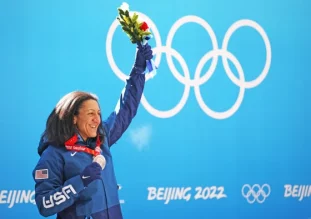
Many people formulate incorrect assumptions about individuals with Down syndrome based on outdated stereotypes. Due to advances in research, medical care, and inclusion, an increasing number of adults with Down syndrome in the U.S. are going taking post-secondary classes or going to college, getting jobs, playing sports, working, getting married and living semi-independent or independent lives.
As a mother, Taylor hopes that her son can see the obstacles she has overcome in her career to inspire him to chase his dreams without hesitation. “If I could advocate for anything to the world, it is to show that our kids have worth, that they can be important and valuable members of our society, and that the people with Down syndrome in our lives should have the same respect and opportunities as anyone else.”
Taylor’s Advice to Families of Individuals with Down Syndrome: “You Are Much Stronger Than You Think”
Parents of children with Down syndrome have some extra hurdles to navigate throughout their child’s life, but these are not infeasible challenges. Therapy, doctor visits, and assisting with daily living tasks can be daunting responsibilities but are not unmanageable compared to the needs of a typical child. Taylor encourages families who either currently have or are about to welcome a child with Down syndrome into their lives to look past the negativity that is so often thrown at them from the outside world and to know that living with a person with Down syndrome is a gift in itself. “I think all of us have that ability inside of us,” Taylor mentions, “just most of us don’t realize we do”.
Taylor and her husband go above and beyond to provide the best for Nico, and when faced with challenges that seem impossible or overwhelming, they are reminded that Nico is a child like any other, and their job as parents is to simply love and support him unconditionally. “Just trust your own abilities and know that you are much stronger than you think.” The Taylors’ unwavering love for Nico has helped them face these new circumstances head-on and accept that while their situation is not a typical one, they can still achieve their goals as a family. Much like Taylor’s unexpected path to the Olympics—averting her original plans of playing softball and taking on a completely new sport—her experience raising Nico has brought her and her family more gratification and joy than they ever could have imagined.
Advocating for a Brighter Future for those with Down Syndrome
Great strides have been made to reverse the harmful, outdated assumptions about people with Down syndrome in society, but there is still a lot of work to do. Many health and medical concerns associated with Down syndrome still do not have adequate research and funding dedicated to them. At GLOBAL, the mission is to significantly improve the lives of people with Down syndrome through research, medical care, education, and advocacy. In 2021, Elana Myers Taylor attended the GLOBAL AcceptAbility Gala in Washington DC and inspired the audience with her work on inclusion and with her powerful speech made with Nico in her arms.
She is clearly someone who leads by example and works to open doors for individuals who are differently-abled in their communities. At the event Taylor announced that she was proud to be an official GLOBAL International Spokesperson joining the ranks of Quincy Jones, Jamie Foxx, John C. McGinley, Frank Stephens, Kyra Phillips, Beverly Johnson, and Amanda Booth. As an International Spokesperson and member of GLOBAL’s Champion Advisory Board, Taylor will work every year to advocate in Washington, DC, her hometown of Atlanta, and around the world.
“I’m so honored and excited to be part of an organization that in a very short time has succeeded in advocating for increased federal Down syndrome research funds,” Taylor says. “We need to have both sides of the aisle advocating for our kids and to come up with a plan to address lifespan and health disparities for black people with Down syndrome as well. Our kids deserve equity, respect, inclusion, and the right to live safe, happy and productive lives.”
Clearly the Down syndrome community has a formidable ally and a new leader in Taylor who understands how to work hard and create real change.
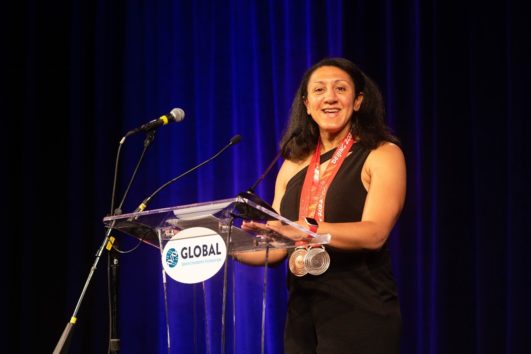
Like this article? Join Global Down Syndrome Foundation’s Membership program today to receive 4 issues of the quarterly award-winning publication, plus access to 4 seasonal educational Webinar Series, and eligibility to apply for Global’s Employment and Educational Grants.
Register today at downsyndromeworld.org!
Collettey’s Cookies: The Taste of Sweet Success
October 28th, 2022 by Global Down Syndrome Foundation
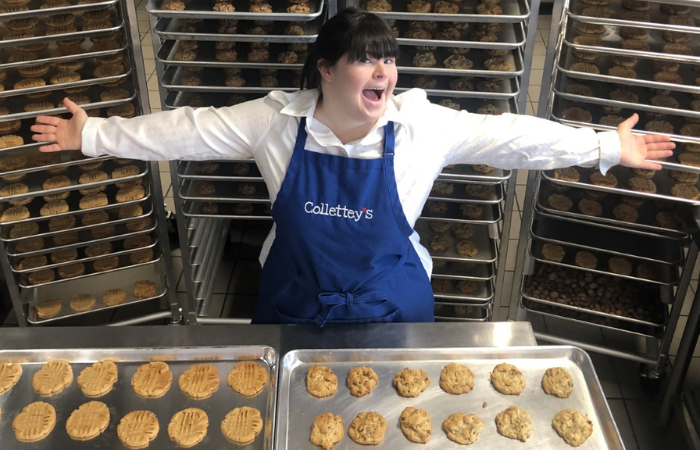
From Down Syndrome WorldTM 2022 Issue 2 of 4, written by Emmy Award winner Hanna Atkinson
The Taste of Sweet Success
 This article was published in the award-winning Down Syndrome World™ magazine. Become a member to read all the articles and get future issues delivered to your door!
This article was published in the award-winning Down Syndrome World™ magazine. Become a member to read all the articles and get future issues delivered to your door! What does success look like?
Let me introduce Collette Divitto, the talented chef and owner of the business she named after her skills, Collettey’s Cookies. Ironically, her idea for the business came after many job interviews and rejection letters. “I was tired of waiting on someone else to make my dreams happen, so I decided I’d make them happen for myself,” says the outstanding 31-year-old entrepreneur.
Collette has always loved baking. In fact, she started creating her masterpieces at the young age of four. Through the years, she tweaked the recipes based on her family’s feedback until eventually she had it down to a science. As her cookies were gaining popularity amongst friends and family, Collette decided to try to sell them for the first time.
When she was in high school, Collette would bake healthy breakfast cookies and sell them in front of local gyms and stores. Her after school gig was small, but successful. “I’ve always been a hard worker, but when I was making my own money working hard, that felt really cool. I wanted to explore that more,” says Collette, who then closed down her cookie business in pursuit of college. She completed a 3-year program at Clemson University with a concentration on food and nutrition. While studying what she’s passionate about, she made sure to make time for all the other excitement that college life had to offer including making new friends, shopping, enjoying apartment life, and going to sports games and concerts, job responsibilities and bills. Collette’s college experience empowered her to feel confident in her independence – she was managing her own school and work schedule, paying her own bills, living on her own, and not relying on her parents.
Eager to apply her expanded culinary knowledge, Collette was disappointed when the traditional post-college job market did not reward her talents and experience with a great job. With the support of her mother, Rosemary, Collette started her own business, Collettey’s Cookies.
“I told Collette that because she’s an adult now, this business venture would need to be more sophisticated than her high school gig,” says Rosemary. “It was important for Collette to learn the whole business ownership process ,including registering the business, doing invoices, and lining up suppliers. She did a great job compiling research and figuring out everything that needed to be done.” And no, Rosemary did not need to teach Collette how to bake – that one is Collette’s specialty!
Running the Kitchen
As a business owner, Collette has a really busy schedule. She runs team meetings daily, where she outlines the team production goals and discusses each employee’s responsibilities. Collette is an expert at cookie preparation; her method ensures every batch of cookies turn out perfectly every time. Collette is passionate about providing thorough training to her employees and she loves giving cooking demonstrations. But the crew makes sure to have fun too! There’s a lot of laughing and smiling happening in the kitchen as they work.”
“I try to create a work environment that helps employees succeed. I encourage them to work hard and be happy.”
A key ingredient of Collette’s managerial style is providing strong support for her team. She is proud that her business hires people with special abilities and promotes the positivity of inclusion. Collette fights for these ideas, including traveling to Washington, D.C. to participate in government advocacy for fair employment policies like proper wages.
Collette welcomes her peers to join with her and encourages them to develop their personal skills. She developed Collettey’s Leadership Program that offers educational workshops on topics ranging from success in school to becoming an entrepreneur.
“Collete is a strong leader because she shares her real experiences with failure and success in hopes that her lessons will help others learn and grow,” says Rosemary. “It’s awesome to watch how people take notice when she begins to talk. They trust her insight, knowing her intentions are good and that she is seeking everyone’s best interest.”
Collette writes about her personal and professional struggles and how she dealt with them in her new book, “Collette in Kindergarten” which recently hit the shelves. The book is the first for an intended series of books that provide her unique perception growing up as a person with Down syndrome. Collette hopes each book will be helpful and positive. Her skills and determination were noticed and are spotlighted in the docuseries called “Born for Business” streaming on Peacock and CRAVE.
Despite Collette’s incredibly packed work schedule, she tries to make time for other hobbies she enjoys like travelling, swimming, tennis, watching movies and sports and evenings out with friends. Collette prioritizes time with family including her sister, Blake Ashley, and her brother, Steele. Rosemary says that they are a close-knit family and are very proud of Collette. When asked what Collette’s greatest strength is, Rosemary quickly said “confidence.”
To which Collette responded with this powerful statement: “No matter who you are, you can make a difference in the world.” Collette is a visionary using her success to impact lives. Now that is truly sweet success.
To learn more about this organization, visit https://colletteys.com/
Like this article? Join Global Down Syndrome Foundation’s Membership program today to receive 4 issues of the quarterly award-winning publication, plus access to 4 seasonal educational Webinar Series, and eligibility to apply for GLOBAL’s Grants.
Register today at downsyndromeworld.org!
GLOBAL’s Position Statement on Humanitarian Crisis in Ukraine
March 29th, 2022 by Global Down Syndrome Foundation
Global Down Syndrome Foundation has been following the developments and grave humanitarian crisis taking place in Ukraine. We are all deeply concerned for the men, women, children, elderly, and people with disabilities who are being forced to leave their homes due to the conflict and those who are still trying to escape Ukraine to neighboring countries.
In dangerous and confusing times such as these, people with disabilities are often overlooked and face greater risk of abandonment, violence, and even death. There are food and medication shortages, and people with disabilities are cut off from support services. The situation is dire.
GLOBAL is adding our voice to international efforts, alongside other Down syndrome and disability organizations from around the world, asking that the parties and governments involved in the conflict respect humanitarian and international rights laws, and we ask that Ukrainians with Down syndrome and other disabilities be prioritized for evacuation and humanitarian aid.
1% BETTER EVERY DAY
April 28th, 2021 by Global Down Syndrome Foundation
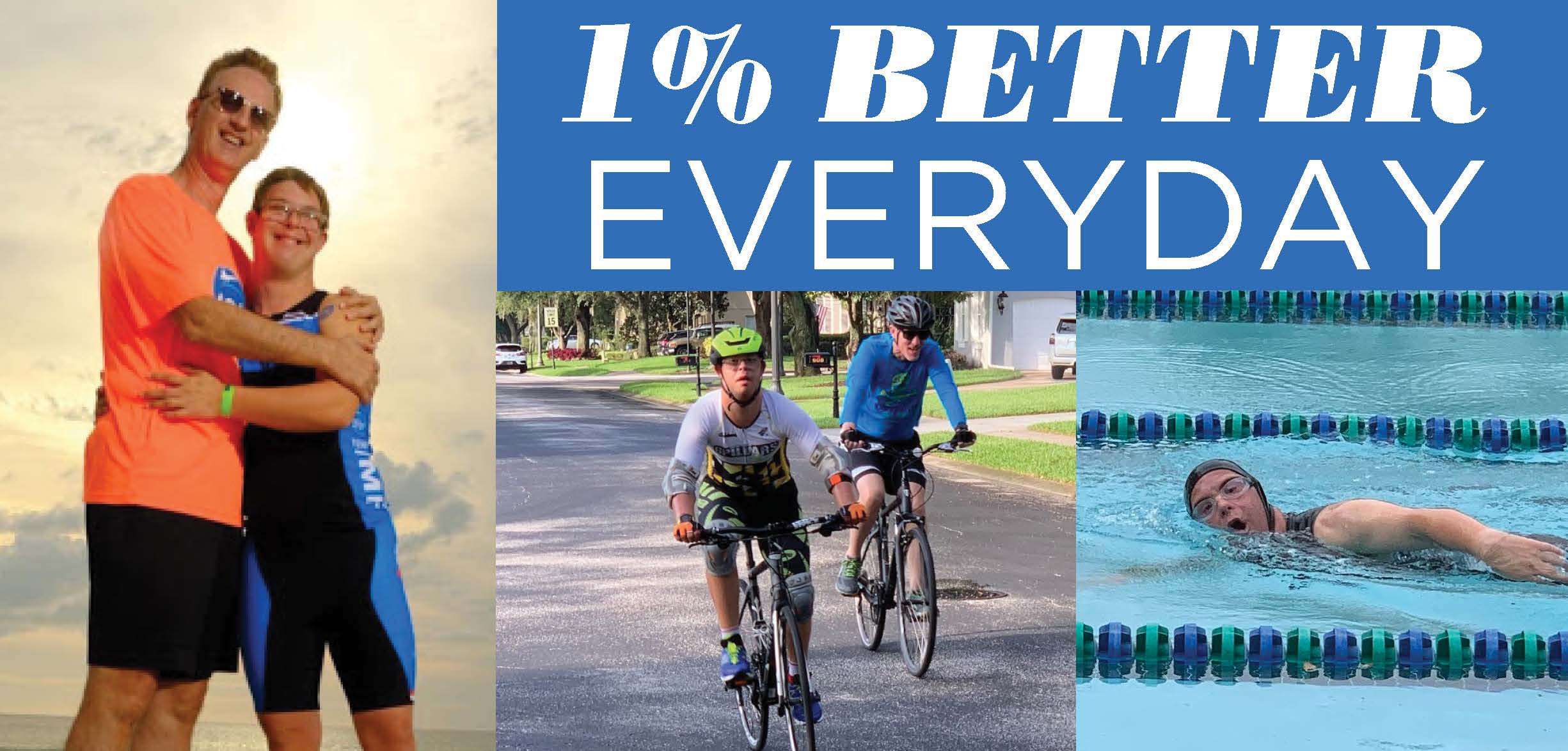
From Down Syndrome WorldTM 2021 Issue 1 of 4
WITH IRON WILL & DETERMINATION, FLORIDA ATHLETE MAKES HISTORY
 This article was published in the award-winning Down Syndrome World™ magazine. Become a member to read all the articles and get future issues delivered to your door!
This article was published in the award-winning Down Syndrome World™ magazine. Become a member to read all the articles and get future issues delivered to your door! WHEN MANY OF US HEAR THE WORDS “IRON MAN,” we might think of the rich Marvel hero in a flying suit. For the 21-year-old athlete, Chris Nikic, “Iron Man” means he can do anything he sets his mind to. In November of 2020, Chris became the first individual with Down syndrome to complete an Ironman triathlon competition, earning him a coveted spot as a GUINNESS WORLD RECORDS® holder as ‘First person with Down’s syndrome to complete an IRONMAN® triathlon.’
The Ironman consists of a 2.4-mile swim, a 112-mile bicycle ride, and a 26.22-mile run. In the world of triathlons, this is considered to be one of the most challenging one-day events. Chris made history by competing in and finishing the race, and serves as an inspiration to the Down syndrome community and the world.
An ambitious attitude, drive, and family support have been the driving forces to propel Chris to new and more extraordinary accomplishments.
“I want to be a world champ at something!” Chris added to his list of New Years’ Eve goals in 2018.
Chris and his father Nik did research and some soul searching to determine that the Ironman triathlon was the way Chris would accomplish that. Nik, who is also an athlete, was ready to train for, and compete in, the triathlon with his son.
Nik made sure Chris was ready to put in the work. “I told him, if you sit on the couch playing video games, you will never get your dreams,” says Nik. “But if you work hard to accomplish your goals, you can do an Ironman and become a motivational speaker.”
After Chris set his intention to compete in Ironman, there was no stopping him. Little did he know what would continue to unfold after successfully completing this intense race.
A FORCE TO BE RECKONED WITH
Chris trains with the mindset of becoming 1 percent better every day. “I built my core 1% at a time. A year ago, I started by doing one push up, one sit up, and one squat. Then every few days, I did a little more,” Chris tells. “Eventually, before Ironman, I was doing 200 of each plus weights, pull-ups, and other strength exercises.”
Chris trains from 3 to 8 eight hours per day, with some stretching and recovery in between. He runs, bikes, swims, and completes strength training four times a week. On the weekends, training is kicked into even higher gear, “I’ll put in 6-8 hours of training each day when I do my 100-mile bike rides, and 18-mile runs.”
Chris’ training is not just physical. His dedication requires a lot of mental strength training too. Chris maintains that anything is possible as long as he can get 1 percent better each day. This mentality helps him stay focused and enjo y his training more.
If Ironman training wasn’t already hard enough, Chris had t o deal with the threat of COVID-19. He admits that training during an unprecedented worldwide pandemic was more challenging, but he wasn’t going to let that get in his way. “There were no gyms to work out in, no lakes to swim or bike trails to ride on,” Chris explains. “So we found ways to train in my home, pool, and neighborhood. It was much harder and less fun, but we found a way to do it anyway.”
THE FOUNDATION OF COMMUNITY
Throughout his training process, Chris had great support from h is family, friends, and community organizations.
Chris and his dad Nik started with intensive training sessions, but when Nik got injured, he decided he was not going to compete in the race and shifted his efforts to being the best coach and cheerleader for Chris.
“Some days, it felt too hard, and I felt like I couldn’t do it,” Chris recalls. “But my dad kept reminding me of my dreams and how important it is to fight for your dreams.”
Chris joined a triathlon club and was paired with a special training coach through the Special Olympics. “My guides at Special Olympics, Simone and Dan, made it fun and helped me through my journey to compete,” Chris tells. “My family and friends were there every step of the way. I thank God for all the special angels he brought into my life.”
“Watching Chris cross that finish line with a huge smile on his face was a moment I will never forget,” says Patty, Chris’ mother. “Seeing your child accomplish something they have worked so hard for is something every parent dreams
of experiencing.”
Chris’ impressive athletic accomplishments have been recognized around the world. His story was featured in national media everywhere including outlets like ESPN, New York Times, Today Show, CNN, NBC, Sports Illustrated, and more.
Special Olympics named Chris a Champion Ambassador, invited him to compete in the USA games, and honored him with the Florida Hero award where he met the state’s governor Ron DeSantis. Ironman gave him the title of Global Ambassador and invited him to Hawaii for the next Ironman competition.
When asked how all of this feels, Chris responded with a simple “I am living my dream.”
HIS SPECIAL MESSAGE FOR THE WORLD
“People have been telling us our whole lives what we can’t do,” says Chris. “And I want to tell you to stop listening to those opinions because they are wrong. We are capable of so much more. Yes, we have disabilities, but we also have big abilities.”
Chris wants to share his experiences and message with the world. He is working on publishing a book this year and he has secured several public speaking events with companies like Dell and Microsoft.
To encourage other athletes in his community, Chris has also launched his own “1% Better Challenge” to promote Down syndrome awareness. The process is simple. Partner up with a sponsor (friend, family, coach), set a 30-day goal you want to achieve, and post your progress with your partner on social media.
“I want to inspire others the way that my community has inspired me. The inclusion revolution is real! Nothing is too big to accomplish or too challenging to do if you commit to being 1% percent better every day.”
Like this article? Join Global Down Syndrome Foundation’s Membership program today to receive 4 issues of the quarterly award-winning publication, plus access to 4 seasonal educational Webinar Series, and eligibility to apply for GLOBAL’s Grants.
Register today at downsyndromeworld.org!
Global Down Syndrome Foundation Raises Crucial Awareness At The First Ever Virtual Be Beautiful Be Yourself Fashion Show
November 19th, 2020 by Global Down Syndrome Foundation
The unprecedented virtual event was an overwhelming success which raised $1.9 million for
life-saving and transformative funds for Down syndrome research and medical care
Press Contacts:
Anca Call | acall@globaldownsyndrome.org | C: (720) 320-3832
Rejena Carmichael | rcarmichael@globaldownsyndrome.org | C: (240) 603-5494
DENVER, CO – November 19, 2020– This weekend, the Global Down Syndrome Foundation (GLOBAL) went virtual for the first time ever and raised over $1.9 million. Now in its 12th year, GLOBAL’s Be Beautiful Be Yourself Fashion Show is the largest fundraiser for Down syndrome in the world and has raised a cumulative $22 million.
Held virtually on Saturday, November 14, the Be Beautiful Be Yourself Fashion Show was a tremendous success. 2020 GLOBAL Ambassador Walt Snodgrass; Music Legend Quincy Jones; supermodels Beverly Johnson and Amanda Booth; award-winning actors John C. McGinley, brothers Matt Dillon and Kevin Dillon, Jeff Probst, Eric Dane, Zack Gottsagen, Jamie Brewer, Megan Bomgaars, Kevin Quinn (appearance arranged by Gotham Artists); Denver Broncos Von Miller, Brandon McManus, Justin Simmons, Jake Butt; Golfer Brad Hennefer; R&B power couple Ronnie & Shamari DeVoe; award-winning journalists Kyra Phillips and John Roberts; musician Sujeet Desai and more, were among those who rocked the virtual runway, which featured 25 beautiful models from 8 states and 3 countries who were introduced by their celebrity escorts. The show’s virtual format provided an extraordinary opportunity for people from across the U.S., and the world, to tune-in and join this inspirational and star-studded event. Full list of celebrity line-up: HERE
“It was an honor to emcee the event this year, and to see how all the pieces came together so magically,” says John C. McGinley, who is a GLOBAL board member and international spokesperson, and father to Max, who has Down syndrome. “It truly was the virtual event of the year!”
“We are so grateful to John C. McGinley, our models, celebrities, and donors that helped make our first virtual event a success,” says Michelle Sie Whitten, GLOBAL’s President and CEO. “With COVID we have had such a tough year working to protect people with Down syndrome who are high risk from the virus, and to help families who have been crushed by the economic impact. Despite all that, GLOBAL was still able to deliver on publishing the first medical care guidelines for adults with Down syndrome, advocate for increased NIH research funding, and support over 2,000 patients with Down syndrome. Sadly, this year we also tragically lost our GLOBAL Ambassador DeOndra Dixon so we’re navigating a lot of loss.”
Later in the evening the legendary music icon Quincy Jones presented his namesake awards, the Quincy Jones Exceptional Advocacy Awards, to this year’s winners, award-winning actress and Grey’s Anatomy star Caterina Scorsone and Spanish model Marián Ávila.
“Modeling, walking a runway, and being featured in advertising campaigns is important to me,” says Marián Ávila, who has modeled in New York Fashion Week and has been profiled in international publications including Vanity Fair. “It makes me feel self-assured and happy. And it is a platform for diversity and equity for people with Down syndrome and all people. I am so honored to receive this award – GLOBAL truly allows the world to see us, hear us, and respect us.”
The show paid a loving tribute to the late DeOndra Dixon who is the inspiration behind GLOBAL’s highest honor, the Quincy Jones Exceptional Advocacy Award. DeOndra tragically passed away last month. Music legend Quincy Jones himself introduced GLOBAL to DeOndra as one of the most articulate, irrepressible, magnetic people he had ever met. GLOBAL and DeOndra’s family have set up the “DeOndra Dixon Down Syndrome Research Fund” to focus on the often-neglected population of African Americans with Down syndrome. Anna and John J. Sie are generously matching $100K for this important research. See full tribute: HERE
“It means so much to our family to see DeOndra’s legacy make a difference for GLOBAL and the Down syndrome community that she inspired,” says Mr. George Dixon, DeOndra’s father. “DeOndra was an angel and a star. I know she is looking down on us, loving on us and watching over us. She is our angel.”
“DeOndra’s fund is so important to the Down syndrome community, especially the African American community. It will give us opportunities to better understand and correct the health disparities for African Americans with Down syndrome,” says Beverly Johnson, a GLOBAL international spokesperson and aunt to Natalie Fuller, a GLOBAL model who happens to have Down syndrome.
Another highlight of the evening were the heartfelt performances honoring those in the Down syndrome community who have battled COVID-19. The Fray’s Isaac Slade gave an exclusive performance of “How to Save a Life,” and Multiplatinum Artist Rachel Platten performed her iconic “Fight Song” and “Better Place,” which left the audience on their feet from the comfort of their own homes. The Ransom Notes shared their wonderful Folk-Americana-Bluegrass music all the way from Nashville and had everyone clapping. To end the evening, Multi-platinum artist and actor Phillip Phillips performed a heartfelt tribute in honor of DeOndra Dixon with a beautiful rendition of “Gone, Gone, Gone.” Rachel Platten and Phillip Phillips’ appearances were arranged through Gotham Artists.
Lou III and Jill Rotella from Omaha chaired the 2020 event – GLOBAL’s first virtual Be Beautiful Be Yourself Fashion Show. Past event chairs include Kacey Bingham and Brittany Bowlen, Peter Kudla, Anna and John J. Sie, Sharon Magness Blake and Ernie Blake, Ricki Rest, Nancy Sevo and Michelle and Tom Whitten. Other notables in attendance included past Global Ambassadors Chase Turner Perry, Kate Winfield, Sam Levin, Sophia Kay Whitten, Louis Rotella IV, Marcus Sikora, and Clarissa Capuano; and past Q-Award winners Tim Harris, Megan Bomgaars, Zack Gottsagen, Karen Gaffney, Sujeet Desai, Brad Hennefer, Jamie Brewer, and Frank Stephens.
Proceeds from GLOBAL’s Be Beautiful Be Yourself Fashion Show help underwrite life-changing and life-saving research and medical care at GLOBAL’s affiliates – the Crnic Institute for Down Syndrome, CU Alzheimer’s and Cognition Center, and the Sie Center for Down Syndrome at Children’s Hospital Colorado, all at the University of Colorado Anschutz Medical Campus.
“We are proud of all the important work we’ve been able to accomplish this year, including receiving NIH grants to study COVID-19 and Down syndrome and launching a clinical trial that aims to cure autoimmune disorders in people with Down syndrome,” says Dr. Joaquin Espinosa, Executive Director of the Crnic Institute. “We couldn’t do any of this without GLOBAL’s support and events like our fashion show help underwrite our Crnic Grant Challenge Grants and important advocacy work.”
The fashion show would not be possible without the generosity of GLOBAL’s Leadership Circle, sponsors, Ambassadors, Q-Awardees, models, Down syndrome partner organizations, celebrities, self-advocates and families.
To continue the work and fight for the down syndrome community, GLOBAL created a Q&A on COVID-19/Down syndrome, provided over 140 families and 42 Down syndrome organizations with COVID-19 Emergency Relief Global Grants, and supported legislation that fights discrimination against those with disabilities during crisis triage care situations.
Missed the event? It’s not too late to get involved! See highlights from the show .
To learn more about the Be Beautiful Be Yourself Fashion Show or to donate, visit www.bebeautifulbeyourself.org
To learn more about the Global Down Syndrome Foundation, visit www.globaldownsyndrome.org
About Global Down Syndrome Foundation
The Global Down Syndrome Foundation (Global) is the largest non-profit in the U.S. working to save lives and dramatically improve health outcomes for people with Down syndrome. Global has donated more than $32 million to establish the first Down syndrome research institute supporting over 400 scientists and over 2,000 patients with Down syndrome from 28 states and 10 countries. Working closely with Congress and the National Institutes of Health, Global is the lead advocacy organization in the U.S. for Down syndrome research and care. Global has a membership of over 100 Down syndrome organizations worldwide, and is part of a network of Affiliates – the Crnic Institute for Down Syndrome, the Sie Center for Down Syndrome, and the University of Colorado Alzheimer’s and Cognition Center – all on the Anschutz Medical Campus.
Global’s widely-circulated medical publications include Global Medical Care Guidelines for Adults with Down Syndrome, Prenatal Testing and Information about Down Syndrome, and the award-winning magazine Down Syndrome WorldTM. Global also organizes the Be Beautiful Be Yourself Fashion Show, the largest Down syndrome fundraiser in the world. Visit globaldownsyndrome.org and follow us on social media (facebook & twitter:@GDSFoundation)(instagram:@globaldownsyndrome).
ON THE SCIENCE FRONTLINES: DOWN SYNDROME RESEARCH AT THE CRNIC INSTITUTE IS HELPING FIGHT AGAINST COVID-19
October 22nd, 2020 by Global Down Syndrome Foundation
From Down Syndrome WorldTM 2020 Issue 2 of 4
AMID A WORLD-WIDE PANDEMIC, THESE SCIENTISTS HAVE FOUND THEMSELVES IN A UNIQUE POSITION TO HELP, THANKS TO YEARS OF STUDYING THE EXCEPTIONAL BIOLOGY OF PEOPLE WITH DOWN SYNDROME.
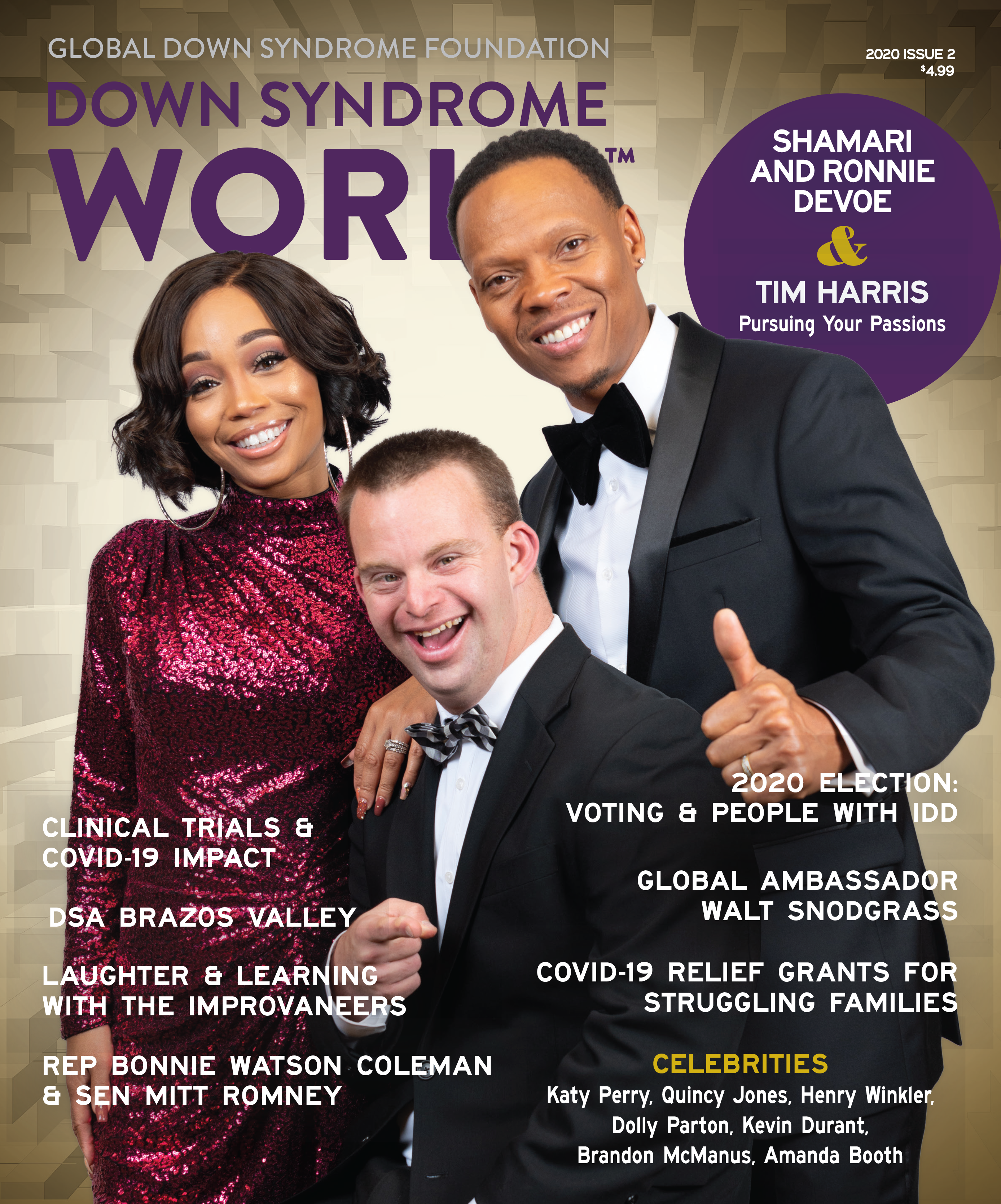
This article was published in the award-winning Down Syndrome World™ magazine. Become a member to read all the articles and get future issues delivered to your door!
CONTRIBUTING IN A MEANINGFUL WAY to the body of science and medical practice surrounding an unprecedented world-wide pandemic is not something most people ever get the opportunity to do. It certainly was not what Executive Director of the Linda Crnic Institute for Down Syndrome, Dr. Joaquín Espinosa, and his team of scientists were thinking about in early March 2020.
During this time, the University of Colorado Anschutz Medical Campus (CU) shut down all research operations, locking scientists out of their buildings and laboratories in response to and to prevent the spread of the novel coronavirus (COVID-19) pandemic. Thankfully, Dr. Espinosa and the Crnic Institute team had their valuable experiments and supplies already gathered and stored away safely. With numerous grants from the National Institutes of Health (NIH), the National Science Foundation, and others, the team had plenty of work that could be performed remotely – analyzing data, writing up results for scientific journals, and preparing new proposals for funding.
Their biggest worry was something they could not work on remotely – the delay of their NIH clinical trial grant to treat autoimmune diseases in people with Down syndrome. In 2016, shortly after launching the Crnic Institute Human Trisome ProjectTM (HTP), the Crnic Institute made one of the most important scientific discoveries – Down syndrome can and should be characterized as an immune system disorder.
In particular, they discovered that an immune system pathway called the “interferon pathway” was “lit up” in people with Down syndrome pretty much 24/7, versus in typical people where it is only turned on when they are fighting a virus or infection and then it turns off.
The constant taxation of the immune system in people with Down syndrome creates low intensity inflammation that over time probably contributes to the co-occurrence of various diseases, including dementia. The Crnic Institute discovery was even more consequential because there are FDA-approved drugs that turn down the interferon pathway in typical people. Crnic Institute scientists were about use one of these FDA-approved drugs, a JAK inhibitor called tofacitinib, in an unprecedented clinical trial for adults with Down syndrome when the pandemic forced lab closures around the world.
AN “AH HA” MOMENT
As serendipity would have it, two days into quarantine, the Crnic team was doing a quick review of the research literature on COVID-19. Their findings revealed something that was both shocking and yet made perfect sense – it appeared that hospitalized COVID-19 patients were displaying many of the same patterns of immune system dysregulation that the Crnic Institute team had spent years studying, analyzing, and annotating in people with Down syndrome.
In COVID-19, the body’s antiviral defense system, which utilizes the interferon pathway, is sent into overdrive, causing the release of high levels of inflammatory signaling molecules known as cytokines. In COVID-19 and other viral infections, this “cytokine storm” is associated with respiratory distress, heart damage, and higher mortality rates. Similarly, people with Down syndrome have higher-than-normal levels of interferon signaling and often display more of a mini cytokine storm, even without a viral infection. Crnic Institute scientists believe this could contribute to many of the hallmarks of and co-occurring medical conditions associated with Down syndrome and are working to understand those connections.
Within a week, Dr. Espinosa and the Crnic Institute were one of a handful of research teams allowed back, with COVID-19 safety measures, into their labs to work on COVID-19 treatments for the general populations and to understand the connection and possible affects and treatments on people with Down syndrome.
Today, Dr. Espinosa is the leader of an international consortium looking at JAK inhibitors to treat COVID-19. The treatment is one of several clinical trials that Dr. Anthony Fauci, Director of the National Institute of Allergy and Infectious Disease at the NIH, has been supporting in the United States. The international consortium includes labs from the United States, China, Italy, France, Spain, Argentina, Mexico, Canada, Germany, and Denmark.
COVID-19 COULD BE MORE SEVERE FOR PEOPLE WITH DOWN SYNDROME
In reviewing the COVID-19 literature, Crnic Institute scientists also realized that people with Down syndrome should probably be considered a “high-risk” group for COVID-19. “High risk” means a person who gets COVID-19 has a higher probability of experiencing more severe illness than a member of the general population without other risk factors. This idea rests on the basis that the strength of the cytokine storm in COVID-19 correlates with disease severity and outcomes, and that people with Down syndrome will be more likely to develop a stronger, more prolonged cytokine storm due to higher levels of baseline interferon signaling. Although the direct studies of COVID-19 in Down syndrome needed to prove or disprove this idea have not yet been performed, ample supporting evidence already exists in the context of other viruses and in our basic understanding of immunology in Down syndrome.
It is also important to consider that people with Down syndrome have increased susceptibility to bacterial pneumonia. Although seemingly unrelated, it has been well documented that pandemics of respiratory viral infections are followed by a surge in cases of bacterial pneumonia, and that a large portion of deaths are actually attributed to secondary bacterial infections. Children with Down syndrome have much higher rates of viral pneumonia and bacterial pneumonia, with the latter being a leading cause of mortality in adults. Taken together, these known phenomena suggest that a person with Down syndrome who contracts COVID-19 would have an increased risk of also acquiring bacterial pneumonia.
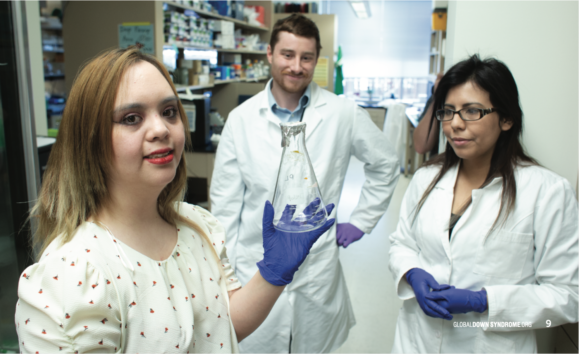
PUTTING TOGETHER ALL THE EVIDENCE:
#1 – People with Down syndrome have higher levels of interferon signaling.
#2 – Once infected, people with Down syndrome have an increased risk of experiencing a stronger cytokine storm and thus a more severe case of COVID-19.
#3 – Both during and after infection with SARS-CoV-2, people with Down syndrome will be more likely to also contract bacterial pneumonia.
It is important to note that these are hypotheses and predictions based on existing evidence outside of COVID-19 and should be taken into consideration with caution. The studies needed to fully understand COVID-19 in people with Down syndrome are still just starting to get underway. The good news is, there are people with Down syndrome, with and without underlying conditions, who are surviving COVID-19. We simply need more data and to better understand this virus before we can definitively come to conclusion.
HOW DOWN SYNDROME RESEARCH FROM THE CRNIC INSTITUTE IS BEING UTILIZED TO STUDY AND TREAT COVID-19
Since March, every member of Dr. Espinosa’s team, from the basic scientists to the clinical researchers, and even the administrators, have been utilizing their unique skills and knowledge gained while working in Down syndrome to rapidly advance COVID-19 research at CU.
For example, Crnic Institute scientists immediately started testing potential therapeutics for the COVID-19 cytokine storm in their mouse model of Down syndrome, nicknamed Dp16. They weren’t actually exposing the Dp16 mice to SARS-CoV-2; they didn’t need to. Instead, the scientists could activate the immune system and stimulate a cytokine storm much like what is seen in COVID-19, simply by using a molecule that tricks the immune system into sensing a virus when there isn’t one. Crnic scientists then treat the mice with JAK inhibitors targeting the interferon signaling pathway that is chronically activated in people with Down syndrome and that drives the cytokine storm in COVID-19. The data resulting from these experiments will be extremely valuable because it can be interpreted and utilized in two contexts: COVID-19 and Down syndrome.
FIGHTING COVID-19 TOGETHER
Who would have ever guessed that Down syndrome research and the discovery that interferon signaling is chronically activated in people with Down syndrome would one day so greatly impact the science and research behind a historic, global pandemic? This meaningful contribution to the body of science and medical practice surrounding COVID-19 is something the Down syndrome community should be proud to be part of. Together, this community of researchers, self-advocates, families, and supporters can clearly make positive scientific impacts not only for people with Down syndrome, but also for the entire world.
THE CRNIC INSTITUTE HUMAN TRISOME PROJECTTM IN ACTION AGAINST COVID-19
At the beginning of the quarantine, CU assembled a centralized team tasked with rapidly creating a biobank to collect blood and other biological samples from COVID-19 patients. These samples would then be administered to researchers with approved projects. This model essentially replicates one of the Crnic Institute’s flagship research initiatives, the Crnic Institute Human Trisome ProjectTM (HTP). The HTP is generating multiple layers of “omics” data (think big data from sequencing all of someone’s DNA and RNA and measuring all their proteins, metabolites, immune cells, and much more) on hundreds of people with and without Down syndrome in order to understand the hallmarks of and co-occurring medical conditions associated with Down syndrome. Having heard about the Crnic Institute’s HTP and Biobank, the CU COVID-19 team reached out to Crnic scientists to tap into their expertise. The Crnic team shared detailed protocols and helped advise the CU team during the development of the CU COVID-19 Biobank.
As part of a synergized endeavor with the COVID-19 Biobank, leading researchers at CU also partnered with Dr. Espinosa and the Crnic team to replicate the experimental platform from HTP and apply it to COVID-19. The parallel effort by CU to apply the HTP platform to COVID-19 has been aptly dubbed “The COVIDome Project,” and Crnic scientists are leading the ongoing data generation to advance COVID-19 research for better diagnostics and therapeutics.
The Crnic team is also partnering with a national COVID-19 collaborative group to specifically study COVID-19 in people with Down syndrome. As explained earlier in this article, so much is yet unknown about COVID-19 in Down syndrome and numerous studies are needed to understand its impacts. The team is working with top data scientists at CU to identify differences in risk factors, symptoms, clinical course, immunological parameters, response to various treatments, and outcomes and long-term effects of COVID-19 in people with Down syndrome. Alongside these efforts, the Crnic team is also studying individuals with Down syndrome who have recovered from a SARS-CoV-2 infection as part of the HTP, in order to assess changes induced by COVID-19 across all the layers of omics data. Together, Crnic scientists hope these efforts will advance our understanding of interferon signaling and the cytokine storm in COVID-19 and Down syndrome and
inform the development of customized preventative and therapeutic solutions.

Like this article? Join Global Down Syndrome Foundation’s Membership program today to receive 4 issues of the quarterly award-winning publication, plus access to 4 seasonal educational Webinar Series, and eligibility to apply for Global’s Employment and Educational Grants.
Register today at downsyndromeworld.org!
Global Honors Supermodel Amanda Booth with Quincy Jones Exceptional Advocacy Award
November 15th, 2019 by Global Down Syndrome Foundation

From Down Syndrome WorldTM 2019 Issue 3 of 4
What happens when a supermodel has a baby with Down Syndrome? Well, she gets him a modeling contract too (obviously)!.
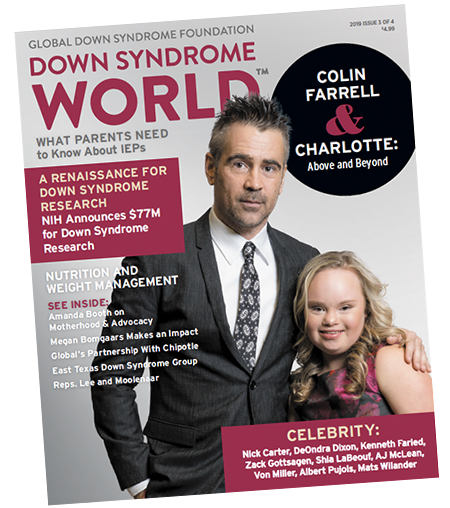 This article was published in the award-winning Down Syndrome World™ magazine. Become a member to read all the articles and get future issues delivered to your door!
This article was published in the award-winning Down Syndrome World™ magazine. Become a member to read all the articles and get future issues delivered to your door! AMANDA BOOTH TRAVELS the world for her career, modeling in fashion editorials and advertising campaigns for companies and publications such as Italian Vogue, Lancôme, Elle, Target, and more. She also has appeared in network television shows such as “Community,” “Hot in Cleveland,” and “Maron.” Yet, Amanda credits her greatest journey to one that takes place right in her own home: parenting her son, Micah, who happens to have Down syndrome. In 2014, Amanda and her husband, Mike, became first-time parents, with all the same questions and fears new parents typically have, plus one that took them by surprise: What is Down syndrome?
The couple embraced Micah from the beginning, and by the time he was 2 years old, his mom had already secured him a modeling contract as well — an act of a mother ’s love but also an act of advocacy for people with Down syndrome in the modeling industry. “We wanted to show the world how beautiful Down syndrome is,” says Amanda.
“We wanted to show the world how beautiful Down syndr ome is,” says Amanda.
Amanda started to share her inspiring journey of motherhood on her social media accounts @lifewithmicah and @amanda_booth. Micah’s story then spread to magazines and online publications, ranging from feature stories and interviews with journalists to guest blogs and articles written by Amanda herself. The mother and son pair have been featured in Harper’s Bazaar US and Australia, Glamour Magazine UK, Mother’s Magazine, Down Syndrome World, The Mighty, and more. Most recently, in September, they were on the cover of Vogue Living Netherlands, making Micah the first person with Down syndrome to be featured on a Vogue magazine cover.
Amanda has used her modeling for fashion retailer Anthropologie to promote Global as well. As the face of the mega brand’s Mother’s Day campaign, Amanda helped raise thousands of dollars for Global’s research and medical care. This year, Amanda will be awarded Global’s prestigious Quincy Jones Exceptional Advocacy Award at the Be Beautiful Be Yourself Fashion Show, the largest fundraiser for Down syndrome in the world.
A PERSONAL JOURNEY OF LIFE, LOVE & ACTIVISM
Amanda and Mike did not learn that Micah had Down syndrome until he was 4 months old.
“I had never met someone with Down syndr ome before. We had a lot of fears, questions, and concerns about what that meant.”
About three years later, Micah received the dual diagnosis of Down syndrome and autism. “Because we got to know Micah as Micah first, his official diagnosis didn’t feel heavy. Ultimately, it was just words on a piece of paper. He was still our funny, lively boy who we love and care for.”
Mike, who is extremely supportive of Amanda’s advocacy, agrees.”
“We believe that Micah will ha ve a wonderful, full life. But we do need to make sure he has access to ex cellent health care.”
Micah was born with hypothyroidism and a very weak immune system. As a result, his interactions with the outside world were limited, and his growth and development were stunted.
“It wasn’t until Micah’s pediatrician looked beyond the fact that it was typical for kids with Down syndrome to have a weak immune
system and instead addressed Micah’s health in a more adequate way that he started to get better,” Amanda remembers.
After receiving the correct diagnosis and taking proper medications, Micah’s health was thriving.
“It’s not enough to accept that certain things happen as a part of a condition like Down syndrome. The key to our children’s future is understanding why and how we can help them receive excellent medical care.”
Amanda says their advocacy work happened very organically.
“We already had been given this large platform through my career and social media,” says Amanda, whose Instagram accounts have more than 150,000 followers combined. “When we learned that Micah would have Down syndrome, it felt like our purpose to share our journey with the world.”
She and Mike started receiving letters from families asking questions and thanking them.
“It wasn’t until then that we started to realize how much we were actually helping families,” Amanda says. “We remember what it felt like getting the diagnosis, so we shared it all, the beautiful moments and the struggles.”
As Micah’s face became more well known in the social media and Down syndrome communities, organizations and publications began reaching out to feature their family. Amanda started writing for and being featured in parent magazines. So while working hard to be good a mother and a successful model and actress, Amanda took on another big job as an activist.
CONNECTING WITH GLOBAL
“Global really opened our eyes to the disparity in research funding for Down syndrome from our National Institutes of Health,” Amanda explains.
When Micah was still a baby, Amanda and Global’s President and CEO connected by phone and talked for over an hour, bonding immediately over their children. Later that year, Amanda, Mike, and Micah attended Global’s annual Be Beautiful Be Yourself Fashion Show, which Amanda defines as a transformational moment in their journey.
“Micah had just turned 1, and it was still a very scary time for us,” Amanda remembers. “But when we walked into the fashion show, we were surrounded by thousands of people with Down syndrome and their families who were so happy. And we met incredible leaders truly making a difference in our community.”
That year, 1,400 attendees, including Hollywood celebrities such as Hillar y Swank, Queen Latifah, John C. McGinley, and more, came to Denver for the event, raising $2 million. To date, the event has raised over $18 million for Down syndrome.
“For the first time as parents, instead of feeling scared for Micah’s future, Mike and I felt excited and hopeful.”
She realized they could help families on a larger scale, by advocating for research and medical care with Global.
The family now attends the event every year, and Amanda has been a powerful spokesperson for Global, including partnering for multiple years with retailers and influencers for Global’s Mother’s Day campaign. In 2018, Amanda was the face of Global’s Mother’s Day campaign with Anthropologie, and in 2019, she rallied the support of her tribe of mommy bloggers to help Global create a special video to pay tribute to the holiday.
In addition to supporting Global’s work, Amanda has been heavily involved with other nonprofits, such as Ruby’s Rainbow and Changing the Face of Beauty.
WHAT’S NEXT?
“I’m just a mom who loves my son and wants the best life for him,” Amanda states. “I want other people to see my son the way I see him. Every person deserves to feel like they belong.”
Amanda will receive Global’s prestigious Quincy Jones Exceptional Advocacy Award along with co-awardee Megan Bomgaars at the 2019 fashion show in November. After learning of Megan’s accomplishments as an entrepreneur, TV star, and public speaker and seeing her high-fashion makeup line photos, Amanda is very excited to meet Megan and talk about their shared mission of inclusion and equality.
“I want to thank the parents before us who fought hard for our kids. People with Down syndrome are slowly being accepted into society, able to attend public school, have careers, and get married. I want to thank Global for ensuring our federal government prioritizes Down syndrome research funding to improve health outcomes,” Amanda says. “But the best way to thank them is not by saying ‘thank you’ — it’s by supporting their truly transformative, effective advocacy work.”
Like this article? Join Global Down Syndrome Foundation’s Membership program today to receive 4 issues of the quarterly award-winning publication, plus access to 4 seasonal educational Webinar Series, and eligibility to apply for Global’s Employment and Educational Grants.
Register today at downsyndromeworld.org!
The Salah Foundation Gifts $75,000 Matching Grant Toward Classes at Global’s New Education Center
November 7th, 2019 by Global Down Syndrome Foundation
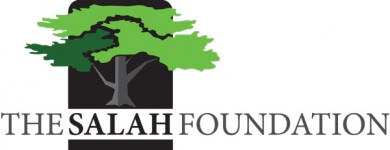
At Global’s 11th annual Be Beautiful Be Yourself Fashion Show, a surprise announcement was made by Noreen Salah Burpee, Executive Director of the Salah Foundation, and delivered by 9News emcees Kim Christiansen and Tom Green. The Salah Foundation matched $75,000 during the live auction that will go to a much-needed Computer Training Class at Global’s new Education Center that was made possible by a transformative $1 million gift from Salah Foundation in 2017.










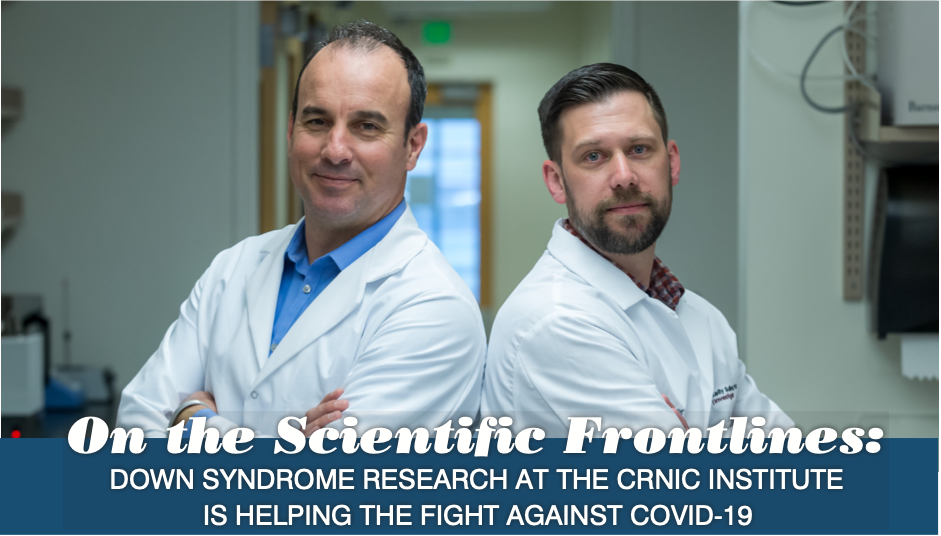
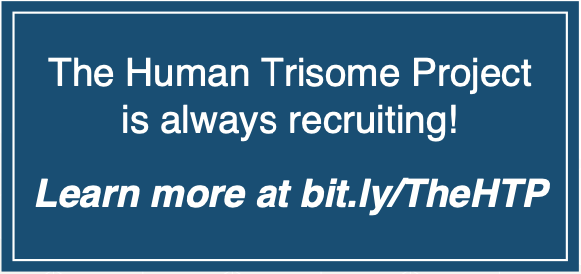
 Experience our inspirational and groundbreaking videos and photos. Our children and self-advocates are beautiful AND brilliant!
Experience our inspirational and groundbreaking videos and photos. Our children and self-advocates are beautiful AND brilliant! Make sure your local Representatives are on the Congressional Down Syndrome Task Force.
Make sure your local Representatives are on the Congressional Down Syndrome Task Force.